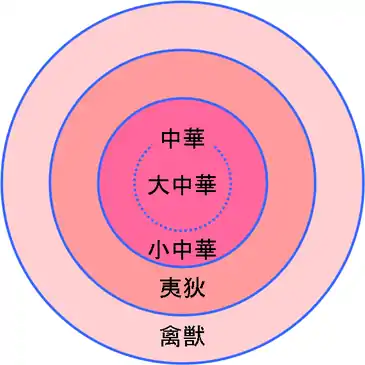Sojunghwa
Sojunghwa (Korean: 소중화; Hanja: 小中華) is a 17th-century Korean concept that means "Little China" referring to the Joseon dynasty.[1][2] After the Manchu-ruled Qing dynasty conquered the Han-ruled Ming dynasty, Koreans thought that barbarians ruined the center of civilization of the world and so Confucianist Joseon Korea had become the new center of the world, replacing Ming China hence the name "Little China."[3][4][5] Tokugawa Japan and Vietnam also had a similar belief in themselves after the Qing dynasty had taken over China.[6][7]
Based on Sinocentrism, the belief that China was the center of civilization in the world, the Chinese believed that Korea, then a tributary state, was a highly civilized state. Meanwhile, the Koreans considered Japanese and the Jurchen people to be barbarians (Chinese: 夷狄; pinyin: yídí) or beasts (Korean: 금수; Hanja: 禽獸; RR: geumsu), based on the Hua–Yi distinction.
References
- Horesh, Niv; Kim, Hyun Jin; Mauch, Peter (2014). Superpower, China? Historicizing Beijing's New Narratives Of Leadership And East Asia's Response Thereto. p. 82. ISBN 9789814619172.
- "Seoul Journal of Korean Studies". 2004.
- 소중화 브리태니커 백과 (Encyclopædia Britannica, Korean edition)
- 小中華思想 世界大百科事典 第2版 (Heibonsha World Encyclopedia)
- Lee, Jeong-Mi (2010) "Choso˘n Korea as Sojunghwa, the Small Central Civilization: Sadae kyorin Policy and Relations with Ming/Qing China and Tokugawa Japan in the Seventeenth Century" Asian cultural studies (36), 305-318, International Christian University
- Berger, Stefan (2007-07-12). Writing the Nation: A Global Perspective. ISBN 9780230223059.
- "Seoul Journal of Korean Studies". 2004.
